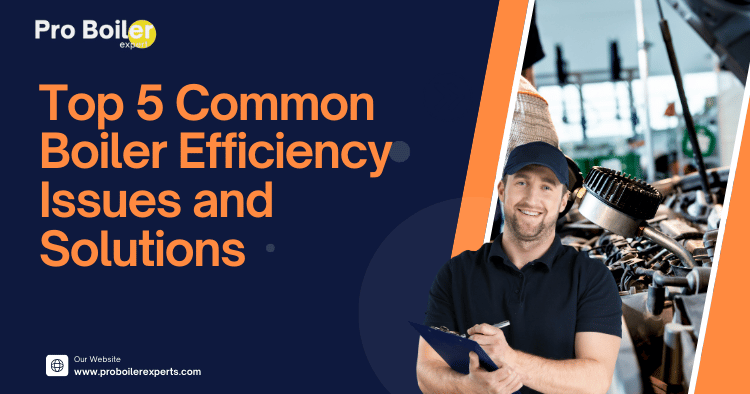Table of Contents
- Introduction
- 1. Inadequate Maintenance
- 2. Incorrect Boiler Sizing
- 3. Poor Water Quality
- 4. Inefficient Controls
- 5. Air Leaks and Insulation Issues
- Conclusion
- FAQs
Introduction
Boilers are essential for heating and hot water in many homes and businesses. However, over time, various issues can affect their efficiency, leading to higher energy bills and an increased carbon footprint. In this article, we will explore the top five common boiler efficiency issues and their solutions, helping you to maximize your boiler’s performance and efficiency.
1. Inadequate Maintenance
One of the most prevalent issues affecting boiler efficiency is inadequate maintenance. Just like any other mechanical system, boilers require regular servicing to ensure they operate correctly.
Why Maintenance is Important
Regular maintenance helps identify and fix minor problems before they escalate into major issues. Neglecting maintenance can lead to decreased efficiency, increased fuel consumption, and costly repairs.
Solutions
- Schedule Regular Inspections: Aim for at least one professional inspection per year. A qualified technician can clean the boiler, check the pressure, and ensure safe operation.
- Self-Maintenance: Homeowners can perform basic maintenance such as checking the pressure gauge, ensuring the radiators are bled, and keeping the area around the boiler clear.
Tip: Consider signing a maintenance contract with a local heating service provider for peace of mind. For more insights, visit Top 5 Benefits of Choosing Combi Boilers for Your Home.
2. Incorrect Boiler Sizing
An improperly sized boiler can lead to inefficient operation. A boiler that is too large will cycle on and off frequently, while one that is too small will struggle to meet heating demands.
How to Identify Sizing Issues
- Oversized Boiler Symptoms: Frequent cycling, high energy bills, and inconsistent heating.
- Undersized Boiler Symptoms: Constantly running, inadequate heating, and higher wear and tear.
Solutions
- Consult a Professional: A heating engineer can perform a heat loss calculation to determine the appropriate size for your boiler based on your home’s specifications.
- Consider Upgrading: If your boiler is significantly oversized or undersized, consider upgrading to a properly sized model.
Resource: For more information on boiler sizing, check out the Ultimate Boiler Size Guide.
3. Poor Water Quality
The quality of water used in your boiler has a direct impact on its efficiency. Hard water can lead to scale buildup, while contaminated water can cause corrosion.
Signs of Poor Water Quality
- Scale Buildup: Visible scaling on the boiler and heating system components.
- Corrosion: Rusty or discolored water and leaks.
Solutions
- Water Treatment: Install a water softener or a chemical dosing system to treat hard water. Regularly check and replace water treatment chemicals as needed.
- Regular Flushing: Schedule periodic flushing of the system to remove scale and debris.
Tip: Always use water that meets the local water quality standards for your boiler system. For eco-friendly options, consider Top 5 Benefits of Biomass Boilers for Eco-Friendly Heating.
4. Inefficient Controls
Modern boilers come equipped with advanced controls that help optimize their efficiency. However, outdated or poorly configured controls can waste energy.
Common Control Issues
- Manual Controls: Older boilers may rely on manual thermostat settings, leading to inconsistent temperatures.
- Inaccurate Sensors: Malfunctioning sensors can misread temperatures, causing the boiler to work harder than necessary.
Solutions
- Upgrade Controls: Consider installing programmable thermostats or smart controls that allow for more precise temperature management. Explore options in Top 5 Smart Boilers Revolutionizing Home Heating 2024.
- Regular Calibration: Have an HVAC technician regularly check and calibrate controls to ensure they are functioning correctly.
Resource: Learn more about smart thermostat benefits at Energy.gov.
5. Air Leaks and Insulation Issues
Air leaks and poor insulation can significantly reduce boiler efficiency by allowing warm air to escape and cold air to enter your home.
Signs of Air Leaks
- Drafts: Noticeable drafts around windows and doors.
- Uneven Heating: Some rooms are significantly warmer or cooler than others.
Solutions
- Seal Leaks: Use weather stripping or caulk to seal gaps around windows and doors.
- Improve Insulation: Check the insulation in your walls, attic, and basement. Adding insulation can help maintain a consistent temperature throughout your home.
Tip: Conduct a home energy audit to identify specific areas for improvement. This will help you maximize efficiency and consider options like Top 5 Boilers for Enhanced Home Insulation 2024.
Conclusion
Addressing these common boiler efficiency issues can lead to significant energy savings and improved comfort in your home or business. Regular maintenance, proper sizing, and attention to water quality, controls, and insulation can keep your boiler running efficiently for years to come.
FAQs
How often should I have my boiler serviced?
It’s recommended to have your boiler serviced at least once a year to ensure optimal performance and safety.
What are the signs that my boiler needs repairs?
Look for signs such as unusual noises, leaks, inconsistent heating, or a sudden increase in energy bills.
Can I perform my own boiler maintenance?
While homeowners can perform basic checks, it’s best to leave deep maintenance and repairs to qualified professionals.
How can I improve my boiler’s efficiency?
Regular maintenance, proper sizing, ensuring good water quality, upgrading controls, and sealing air leaks can all improve efficiency.
Feel free to reach out if you have more questions or need assistance with your boiler!





